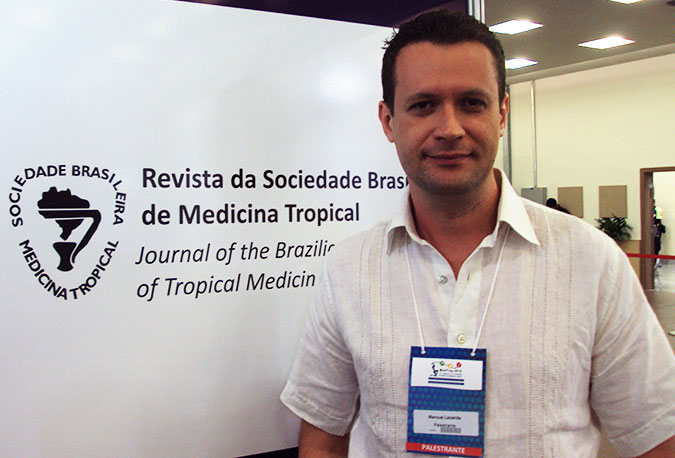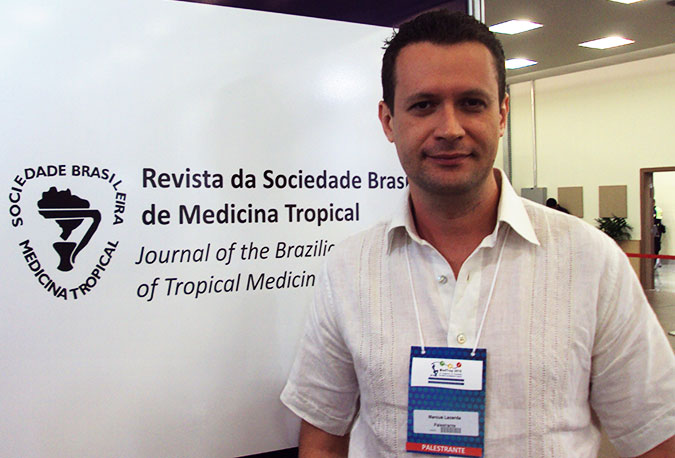
Dr. Marcus Lacerda é eleito presidente da SBMTDr. Marcus Lacerda is the BSTMs new president
Novo presidente comandará a Sociedade no biênio 2015-2017, e pretende pautar o seu mandato com a mesma competência de seu antecessor, Dr. Mitermayer Galvão dos ReisNew president will lead the society for the 2015-2017 biennium, and intends to guide his term with the same experience of his predecessor, Dr. Mitermayer Galvão dos Reis
16/06/2015 Dr. Marcus Vinícius Guimarães de Lacerda é doutor em Medicina Tropical pela Universidade de Brasília (UnB) em parceria com a Universidade de Nova York, com especialização em infectologia. O novo presidente da Sociedade Brasileira de Medicina Tropical (SBMT) foi eleito durante o 51º MedTrop, realizado entre os dias 14 e 17 de junho em Fortaleza/CE e estará à frente da Sociedade até 2017.
Dr. Marcus Vinícius Guimarães de Lacerda é doutor em Medicina Tropical pela Universidade de Brasília (UnB) em parceria com a Universidade de Nova York, com especialização em infectologia. O novo presidente da Sociedade Brasileira de Medicina Tropical (SBMT) foi eleito durante o 51º MedTrop, realizado entre os dias 14 e 17 de junho em Fortaleza/CE e estará à frente da Sociedade até 2017.
Dr. Marcus coordena desde 2007 o Centro Internacional de Pesquisa Clínica em Malária (CIPCliM) em Manaus, atualmente ocupa o cargo de Diretor de Ensino e Pesquisa da FMT-HVD, e desde 2014 é especialista em Saúde Pública do Instituto Leônidas e Maria Deane (Fiocruz Amazônia). Além disso, é membro do Comitê de Assessoramento Técnico do Programa Nacional de Controle da Malária e do Subcomitê de Terapêutica em Malária, do Ministério da Saúde. Há alguns anos participa ativamente de iniciativas voltadas para a eliminação da malária, tais como malERA, MESA e Mesoamerica Initiative.
Confira abaixo entrevista com o novo presidente eleito.
SBMT: Fale um pouco sobre sua experiência na área da Medicina Tropical.
Dr. Marcus: Tenho tido desde 2000 a oportunidade de fazer assistência médica e pesquisa em malária em Manaus, coordenando um grupo de pesquisa que se volta para o estudo multidisciplinar desse importante agravo tropical ainda muito importante no Norte do País. Mais recentemente também tenho me voltado para o estudo dos acidentes por animais peçonhentos e o HIV/Aids no contexto das áreas tropicais.
SBMT: Quais são os projetos que o senhor pretende implantar a frente da SBMT durante seu mandato?
Dr. Marcus: Principalmente o fortalecimento dos congressos de Medicina Tropical, integrando mais a área clínica com a área básica, além de incentivar o nosso principal veículo de comunicação científica, a Revista da SBMT.
SBMT: O senhor assume a SBMT com um perfil etário diferenciado. Em sua opinião, isso pode contribuir para trazer uma maior participação de jovens?
Dr. Marcus: Nossa sociedade precisa contar com a imensa experiência dos mais antigos, mas também atrair jovens pesquisadores, o que vai garantir a sua estabilidade por muitas mais décadas. Continuar investindo nas mídias sociais é fundamental para atingir o jovem estudante e pesquisador, além de mostrar o mercado de trabalho do jovem tropicalista dentro e fora do Brasil. A maior divulgação dos programas de residência médica em Medicina Tropical em São Paulo, Manaus e Cuiabá é de fundamental importância para estimular a capacitação de jovens médicos idealistas e com perfil para seguir a careira acadêmica.
SBMT: Sua gestão pretende investir em pesquisas e na realização de eventos? Quais?
Dr. Marcus: Trazer eventos internacionais para o Brasil dá grande visibilidade à nossa sociedade. Em 2017 estamos organizando a 6ª. Conferência Internacional de Pesquisa em Malária por Plasmodium vivax. A SBMT também precisa estar mais inserida nos congressos de Medicina Tropical internacionais.
SBMT: Em sua opinião, o que pode ser feito para que a Medicina Tropical tenha uma prioridade maior no governo brasileiro?
Dr. Marcus: É preciso mensurarmos melhor a carga dessas doenças, além de motivar estudos de economia em saúde que estimem os custos que o País ainda tem que assumir, enquanto poderíamos estar nos dedicando mais a outras doenças crônico-degenerativas. O Brasil é pioneiro na inovação e na gestão das endemias tropicais e precisa agora se voltar para mostrar ao mundo como fazer a eliminação das doenças e não apenas o seu controle. È o caso da malária.
SBMT: Para finalizar, gostaria que o senhor fizesse um balanço sobre o 51º Congresso de Medicina Tropical realizado em Fortaleza.
Dr. Marcus: Mais uma vez conseguiu atrair jovens que são o futuro dessa Sociedade. Além disso, foi pautado pela oportunidade em tratar de temas emergentes como Zica vírus. É uma Sociedade com velhos problemas a resolver, mas com um olhar para o futuro. O 52º. MedTrop, a se realizar em Maceió, em 2016, deve ter o mesmo sucesso. Dr. Marcus Vinicius Guimaraes de Lacerda is a Tropical Medicine Doctor from the Brasilia University (UnB) in partnership with the New York University, specialized in infectious diseases. The new president of the Brazilian Society of Tropical Medicine was elected during the 51st Medtrop, that took place from June 14 to 17 in Fortaleza, Ceara and will lead the society until 2017.
Dr. Marcus Vinicius Guimaraes de Lacerda is a Tropical Medicine Doctor from the Brasilia University (UnB) in partnership with the New York University, specialized in infectious diseases. The new president of the Brazilian Society of Tropical Medicine was elected during the 51st Medtrop, that took place from June 14 to 17 in Fortaleza, Ceara and will lead the society until 2017.
Dr. Marcus coordinates the International Clinical Malaria Research Center (CIPCliM) in Manaus since 2007, and currently is Director of Lecture and Research of the FMT-HVD, and since 2014 is specialist in Public Health at the Leonidas and Maria Deane Institute (Fiocruz Amazon). Besides this, is member of the Technical Advisory Committee of the National Program of Malaria Control and subcommittee of Malaria Therapy, from the Health Ministry. Since a few years, he is active among initiatives aming malaria elimination, as malERA and Mesoamerica Initiative.
Find below an interview with the new elected president.
SBMT: What can you tell about your experience in Tropical Medicine?
Dr. Marcus: Since the year 2000 I have had the opportunity to conduct malaria medical assistance in Manaus, coordinating a research group focused in the multidisciplinary study of this disease, still so relevant in North Brazil. Most recently I have turned over to the study of accidents involving venomous animals and HIV/AIDS within the tropical areas context.
BSTM: Which are the projects you intend to implement while ahead of the BSTM?
Dr. Marcus: Especially strengthen the Tropical Medicine conferences, integrating the clinical and basic areas, besides encouraging our main communication vehicle, the BSTM Journal.
BSTM: You take office at the BSTM with a differentiated age profile. In your opinion, could this contribute to gather more participation of the young?
Dr. Marcus: Our society must rely on the immense experience of the older members, but also attract younger researchers, what will ensure it stability for many decades. Keeping the investments in social medias is fundamental to reach the young student and researcher, besides evidencing the domestic and international markets for young tropicalists. The greater awareness of the medical residency programs in Tropical Medicine in Sao Paulo, Manaus and Cuiaba is essentially important to stimulate the capacitation of young idealist doctors, with a profile for academic career.
BSTM: Do you intend to invest in research and promoting events? Where?
Dr. Marcus: Hosting international events in Brazil gives our society great visibility. In 2017, we are organizing the International Conference of Research on Plasmodium vivax Malaria. The BSTM also must be present in International Tropical Medicine conferences.
BSTM: In your opinion, what could be done to achieve greater Tropical Medicine priority in the Brazilian government?
Dr. Marcus We must measure the load of these diseases, besides motivating health economy studies to estimate how much the Country must still invest, while we could dedicate ourselves to other chronic-degenerative diseases. Brazil is pioneer in innovation and tropical diseases management and must now show the world how to eliminate diseases, not only how to control them. This is the case of malaria.
BSTM: At last, could you give us a balance of the 51st Tropical Medicine Congress in Fortaleza?
Dr. Marcus Once again we could reach the youngsters who are the future of this society. Besides this, the event was guided by the opportunity to deal with emerging themes as Zika virus. We are a society of old problems to solve, but with the eyes on the future. The 52nd Medtrop, to take place in Maceio in 2016, should have the same success.…










